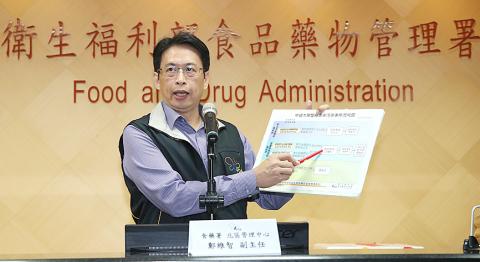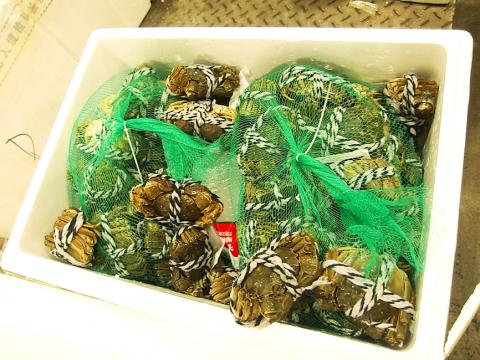Eight shipments of crabs imported from China have failed dioxin tests this year, the Food and Drug Administration (FDA) said yesterday, adding that two companies face combined fines of more than NT$100 million (US$3.25 million).
The FDA last week reported that 14.954 tonnes of hairy crabs — also known as Chinese mitten crabs, a seasonal delicacy in Taiwan, Hong Kong and China — imported in three batches from China were found to exceed minimum dioxin standards.
Two batches were imported from Anhui and Jiangxi provinces by Ciaoaibo International Enterprises (喬艾舶國際企業), and the other was imported from Anhui Province by Youfong Enterprises (侑豐企業), the FDA said.

Photo: CNA
The crabs were found to have residual dioxin and dioxin-like polychlorinated biphenyls (DL-PCB) exceeding maximum allowable residue levels of 3.5 picograms per gram for dioxin and 6.5 picograms per gram for DL-PCB, the agency said.
About 3.5 tonnes imported by Ciaoaibo International are missing, possibly sold illegally before the inspection results were completed, it said.
The FDA said it has conducted special inspections of imported crabs in cooperation with the Coast Guard Administration, the Seventh Special Police Corps and local health bureaus, which found five previous batches of dioxin-contaminated crabs, with a combined weight of about 25.3 tonnes.

Photo courtesy of the Food and Drug Administration
Two batches from Zhejiang Province and one from Jiangxi Province were imported by Ciaoaibo International, one batch imported by Youfong was from Anhui Province and one batch was imported by Yuetzu International Trading Co (約諮國際貿易) from Hunan Province, the FDA said.
About 5.8 tonnes imported by Ciaoaibo International or Yuetzu International are also missing, it said.
The FDA said that it has inspected 42 batches of hairy crabs from China so far this year, with eight batches (40.2765 tonnes) exceeding allowable levels of dioxin and DL-PCB, while 9.3126 tonnes were unaccounted for.
FDA Northern Center Deputy Director Cheng Wei-chih (鄭維智) said the missing crabs were being traced and the case is being handled by prosecutors.
The FDA will fine Ciaoaibo International NT$98.4 million and Yuetzu International NT$18.4 million for breaches of the Act Governing Food Safety and Sanitation (食品安全衛生管理法), Cheng said, adding that companies found to have broken the law would be dealt with strictly.

AIR SUPPORT: The Ministry of National Defense thanked the US for the delivery, adding that it was an indicator of the White House’s commitment to the Taiwan Relations Act Deputy Minister of National Defense Po Horng-huei (柏鴻輝) and Representative to the US Alexander Yui on Friday attended a delivery ceremony for the first of Taiwan’s long-awaited 66 F-16C/D Block 70 jets at a Lockheed Martin Corp factory in Greenville, South Carolina. “We are so proud to be the global home of the F-16 and to support Taiwan’s air defense capabilities,” US Representative William Timmons wrote on X, alongside a photograph of Taiwanese and US officials at the event. The F-16C/D Block 70 jets Taiwan ordered have the same capabilities as aircraft that had been upgraded to F-16Vs. The batch of Lockheed Martin

US President Donald Trump yesterday announced sweeping "reciprocal tariffs" on US trading partners, including a 32 percent tax on goods from Taiwan that is set to take effect on Wednesday. At a Rose Garden event, Trump declared a 10 percent baseline tax on imports from all countries, with the White House saying it would take effect on Saturday. Countries with larger trade surpluses with the US would face higher duties beginning on Wednesday, including Taiwan (32 percent), China (34 percent), Japan (24 percent), South Korea (25 percent), Vietnam (46 percent) and Thailand (36 percent). Canada and Mexico, the two largest US trading

GRIDLOCK: The National Fire Agency’s Special Search and Rescue team is on standby to travel to the countries to help out with the rescue effort A powerful earthquake rocked Myanmar and neighboring Thailand yesterday, killing at least three people in Bangkok and burying dozens when a high-rise building under construction collapsed. Footage shared on social media from Myanmar’s second-largest city showed widespread destruction, raising fears that many were trapped under the rubble or killed. The magnitude 7.7 earthquake, with an epicenter near Mandalay in Myanmar, struck at midday and was followed by a strong magnitude 6.4 aftershock. The extent of death, injury and destruction — especially in Myanmar, which is embroiled in a civil war and where information is tightly controlled at the best of times —

China's military today said it began joint army, navy and rocket force exercises around Taiwan to "serve as a stern warning and powerful deterrent against Taiwanese independence," calling President William Lai (賴清德) a "parasite." The exercises come after Lai called Beijing a "foreign hostile force" last month. More than 10 Chinese military ships approached close to Taiwan's 24 nautical mile (44.4km) contiguous zone this morning and Taiwan sent its own warships to respond, two senior Taiwanese officials said. Taiwan has not yet detected any live fire by the Chinese military so far, one of the officials said. The drills took place after US Secretary